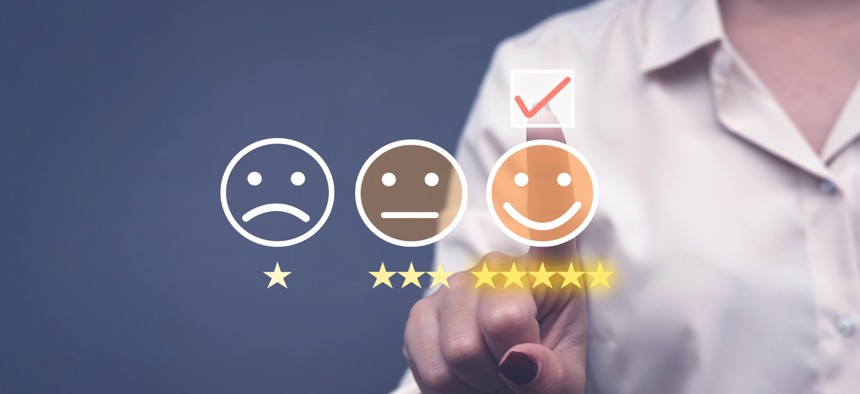Only a transformation of service delivery can rebuild trust in government. Here’s how.

Kiyoshi Hijiki/Getty Images
The COVID-19 pandemic proved all federal agencies need to become great at service delivery, and an executive order provides the authority. It's time to get moving.
To fix longstanding problems in service delivery and customer service, the government needs a fundamental transformation -- to become great at service delivery. This can be done by addressing key root causes with speed, upskilling the federal workforce to excel at service delivery and reimagining security and oversight -- to ultimately empower innovative teams to deliver meaningful improvements.
Currently, Americans expect long wait times and confusing status updates when applying for retirement benefits or filing their taxes -- and that's before the COVID pandemic pushed these challenges into a full-blown crisis, prompting President Biden to issue the Executive Order on Transforming Federal Customer Experience and Service Delivery to Rebuild Trust in Government in December 2021.
COVID created unprecedented demand for stimulus payments and unemployment benefits. Outdated mainframe technology crumpled under the surge, delayed relief efforts, and jeopardized payments to people needing it most. Paper backlogs and unopened mail emerged as root causes of benefit processing and payment delays. As field offices closed in 2020, call volumes hit historic highs, but the IRS and Social Security Administration could only answer 11% and 51% of inbound calls during that period, respectively.
Biden's mandate asserts that the government "focus on the experience of the actual people whom it is meant to serve," seeks to reduce the burden (or "time tax") Americans experience accessing their entitled federal benefits, and requires agencies deliver benefits quickly, easily, equitably, securely, and transparently -- online, in person, and over the phone. The Executive Order outlines 35 specific areas, including the IRS and Social Security Administration, to "raise the standard of experience across government," and will track progress and improvements quarterly on a public dashboard.
Americans expect commercial-grade customer experiences and services, and the government is overdue to deliver. The executive order is a much-needed catalyst and a significant step forward. Covidtests.gov is leading the way. It was created to deliver 500 million rapid tests to Americans at home, was built in three weeks and handled 68 million visits in week one. Tech teams fixed an address bug in just days. To enable more great experiences like this one, the government will need to take additional steps to empower innovative teams to deliver meaningful improvements.
First, agencies must quickly address the root causes preventing great customer experiences and service delivery. Federal agencies are siloed; program owners, policy makers, and IT don't collaborate on service delivery. This is evident when trying to renew a passport or apply for retirement benefits online -- outdated policies require validation of original paperwork in person, and 1960s IT systems can't easily accommodate new online processes or policy changes. By creating cross-functional teams to quickly discover the key challenges for Americans seeking benefits, agencies can identify and address the root causes in days or weeks, not years.
Next, agencies must retrain civil servants in commercial standards for service delivery. Today, great customer experiences are powered by software and delivered online. Civil servants have abundant mission context and talent, but often lack specialized technical and service design skills needed to deliver great experiences.
While the government has innovative programs to attract and retain technical talent, hiring alone will not close the skills gap; federal employees need to be trained. One approach is to upskill by a short and immersive "learn by doing" model, paired side by side with industry experts to create new, commercial-grade experiences. While there is ultimately no substitute for the lived experience of building software that delivers great customer service, hands-on upskilling is a proven approach that has closed skill gaps in the private sector and in pilot programs at federal agencies.
The Pentagon is already seeing the benefits of upskilling federal employees. Five years ago, it recognized that a new approach to delivering software would directly mitigate the daily existential threat from more nimble enemies. It built dedicated units of software and service delivery teams in each branch by upskilling existing uniformed personnel. Now, every single day, in-house teams of federal employees in the U.S. Army, Space Force, and U.S. Air Force deliver mission-critical applications.
Upskilling has cascading benefits for agencies that want to deliver better customer experiences. Leaders trained in commercial standards can better manage technical contractors, maintain accountability for their customer outcomes and service delivery no matter who is delivering the work, and spot stalled progress before a tangible impact. If industry leaders of retail and banking don't blame contractors for their customer experience failures, why should the government?
Finally, once federal employees can repeatedly build commercial grade experiences, the government will need new, commercial-speed security and infrastructure processes that support rapid delivery to the public. The Defense Department is leading the way, establishing novel ways to continuously monitor cybersecurity risk, as well as modern tooling and practices to quickly and repeatedly validate code functionality and data privacy, and auto-scale infrastructure to meet peak demand.
By taking all these steps, all federal agencies can empower innovative teams to deliver meaningful customer service and service delivery improvements -- securely and repeatedly -- every single day.
This pandemic has proved all federal agencies need to become great at service delivery and the order gives the mandate. It's time for the government to reassure Americans who have lost faith that government agencies can deliver benefits quickly, easily, equitably, securely, and transparently. This is a once-in-a-lifetime opportunity to transform the way the government delivers value to the people it serves. If not now, when?
Lauren Gilchrist is director, civilian and SLED, VMware Tanzu Labs Public Sector
NEXT STORY: VA Employees and Contractors Can Now Add Pronouns to Digital Signatures


